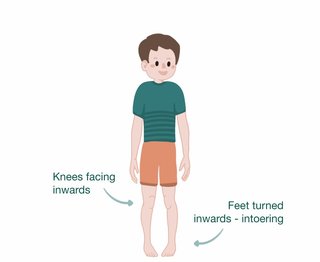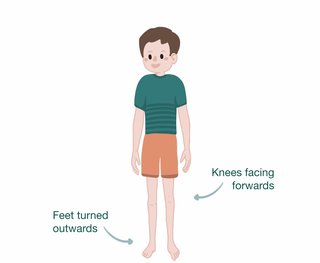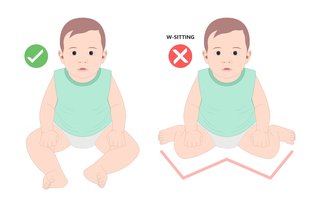Some children's feet turn in (in-toe) or turn out (out-toe) when they walk.
This is very common during early childhood. It is part of the normal development of the musculoskeletal system. It may change with time and as a child gets older.
Children with in-toeing or out-toeing are usually completely healthy.


Non-urgent advice: Contact your GP if:
- your child has in-toeing or out-toeing and has foot pain or stiffness
Your GP can do a physical examination to decide if a referral to physiotherapy would be helpful.
How it affects your child
Children who in-toe or out-toe may seem to fall more often than other children. This is usually because they are still learning to walk and run. This will improve with time.
Most children do not need treatment for in-toeing or out-toeing. The conditions usually correct themselves.
They do not affect your child’s ability to walk, run or jump in the long term.
In-toeing and out-toeing might appear worse when your child is tired. But the condition is not painful and they can do activities as usual.
How to help your child
There are things you can do to help correct in-toeing or out-toeing in your child.
Try to discourage them from W-sitting. This when a child sits with their knees pointing forward and their feet pointing to the side near their hips.

Help your child to stretch their hamstring muscles, if these are tight. A physiotherapist can show you and your child how to do this.
When buying shoes for your child, choose shoes that:
- are comfortable
- support your child's feet
- are flexible
- do not restrict the movement of your child's feet
Other ways to help a child who in-toes
You could help a child who in-toes to do:
- activities to strengthen their hip muscles - such as out-toed walking (penguin walking) or walking along a straight line (keeping their feet straight)
- ballet, horse riding, martial arts or swimming breaststroke
Other ways to help a child who out-toes
You can help a child who out-toes by getting them to:
- do activities to strengthen their hip muscles, such as walking along a straight line (keeping their feet straight)
Don't
-
do not put your child's shoes on the opposite feet - this will not help
-
do not give your child heavy shoes to wear - these may cause them to trip
When a child walks on the tips of their toes
It is common for children age 3 or under to walk on the tips of their toes. This usually goes away on its own if your child can stand with their feet flat.
You can help your child to stop walking on the tips of their toes by getting them to:
- stand with their feet flat on the floor
- do activities such as penguin walking - this helps your child to stand with their feet flat on the floor
Non-urgent advice: Contact your GP or a physiotherapist if
your child walks on the tips of their toes and:
- has stiff ankles
- rarely stands with their feet flat
- is not growing out it
